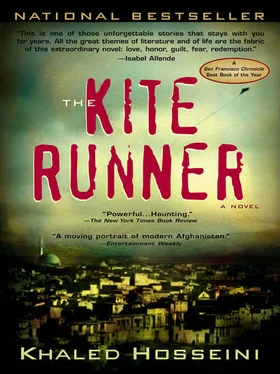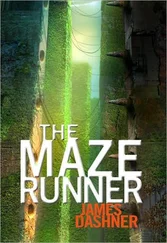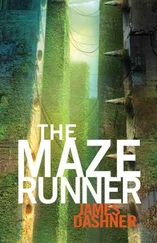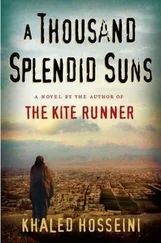“He did?”
“Oh yes.”
“So you’re familiar with my situation.”
Faisal dabbed at the sweat beads above his lips. “I’m familiar with the version of the situation you gave Mr. Andrews,” he said. His cheeks dimpled with a coy smile. He turned to Sohrab. “This must be the young man who’s causing all the trouble,” he said in Farsi.
“This is Sohrab,” I said. “Sohrab, this is Mr. Faisal, the lawyer I told you about.”
Sohrab slid down the side of his bed and shook hands with Omar Faisal. “ Salaam alaykum ,” he said in a low voice.
“ Alaykum salaam , Sohrab,” Faisal said. “Did you know you are named after a great warrior?”
Sohrab nodded. Climbed back onto his bed and lay on his side to watch TV.
“I didn’t know you spoke Farsi so well,” I said in English. “Did you grow up in Kabul?”
“No, I was born in Karachi. But I did live in Kabul for a number of years. Shar-e-Nau, near the Haji Yaghoub Mosque,” Faisal said. “I grew up in Berkeley, actually. My father opened a music store there in the late sixties. Free love, headbands, tie-dyed shirts, you name it.” He leaned forward. “I was at Woodstock.”
“Groovy,” I said, and Faisal laughed so hard he started sweating all over again. “Anyway,” I continued, “what I told Mr. Andrews was pretty much it, save for a thing or two. Or maybe three. I’ll give you the uncensored version.”
He licked a finger and flipped to a blank page, uncapped his pen. “I’d appreciate that, Amir. And why don’t we just keep it in English from here on out?”
“Fine.”
I told him everything that had happened. Told him about my meeting with Rahim Khan, the trek to Kabul, the orphanage, the stoning at Ghazi Stadium.
“God,” he whispered. “I’m sorry, I have such fond memories of Kabul. Hard to believe it’s the same place you’re telling me about.”
“Have you been there lately?”
“God no.”
“It’s not Berkeley, I’ll tell you that,” I said.
“Go on.”
I told him the rest, the meeting with Assef, the fight, Sohrab and his slingshot, our escape back to Pakistan. When I was done, he scribbled a few notes, breathed in deeply, and gave me a sober look. “Well, Amir, you’ve got a tough battle ahead of you.”
“One I can win?”
He capped his pen. “At the risk of sounding like Raymond Andrews, it’s not likely. Not impossible, but hardly likely.” Gone was the affable smile, the playful look in his eyes.
“But it’s kids like Sohrab who need a home the most,” I said. “These rules and regulations don’t make any sense to me.”
“You’re preaching to the choir, Amir,” he said. “But the fact is, take current immigration laws, adoption agency policies, and the political situation in Afghanistan, and the deck is stacked against you.”
“I don’t get it,” I said. I wanted to hit something. “I mean, I get it but I don’t get it.”
Omar nodded, his brow furrowed. “Well, it’s like this. In the aftermath of a disaster, whether it be natural or man-made – and the Taliban are a disaster, Amir, believe me – it’s always difficult to ascertain that a child is an orphan. Kids get displaced in refugee camps, or parents just abandon them because they can’t take care of them. Happens all the time. So the INS won’t grant a visa unless it’s clear the child meets the definition of an eligible orphan. I’m sorry, I know it sounds ridiculous, but you need death certificates.”
“You’ve been to Afghanistan,” I said. “You know how improbable that is.”
“I know,” he said. “But let’s suppose it’s clear that the child has no surviving parent. Even then, the INS thinks it’s good adoption practice to place the child with someone in his own country so his heritage can be preserved.”
“What heritage?” I said. “The Taliban have destroyed what heritage Afghans had. You saw what they did to the giant Buddhas in Bamiyan.”
“I’m sorry, I’m telling you how the INS works, Amir,” Omar said, touching my arm. He glanced at Sohrab and smiled. Turned back to me. “Now, a child has to be legally adopted according to the laws and regulations of his own country. But when you have a country in turmoil, say a country like Afghanistan, government offices are busy with emergencies, and processing adoptions won’t be a top priority.”
I sighed and rubbed my eyes. A pounding headache was settling in just behind them.
“But let’s suppose that somehow Afghanistan gets its act together,” Omar said, crossing his arms on his protruding belly. “It still may not permit this adoption. In fact, even the more moderate Muslim nations are hesitant with adoptions because in many of those countries, Islamic law, Shari’a , doesn’t recognize adoption.”
“You’re telling me to give it up?” I asked, pressing my palm to my forehead.
“I grew up in the U.S., Amir. If America taught me anything, it’s that quitting is right up there with pissing in the Girl Scouts’ lemonade jar. But, as your lawyer, I have to give you the facts,” he said. “Finally, adoption agencies routinely send staff members to evaluate the child’s milieu, and no reasonable agency is going to send an agent to Afghanistan.”
I looked at Sohrab sitting on the bed, watching TV, watching us. He was sitting the way his father used to, chin resting on one knee.
“I’m his half uncle, does that count for anything?”
“It does if you can prove it. I’m sorry, do you have any papers or anyone who can support you?”
“No papers,” I said, in a tired voice. “No one knew about it. Sohrab didn’t know until I told him, and I myself didn’t find out until recently. The only other person who knows is gone, maybe dead.”
“Hmm.”
“What are my options, Omar?”
“I’ll be frank. You don’t have a lot of them.”
“Well, Jesus, what can I do?”
Omar breathed in, tapped his chin with the pen, let his breath out. “You could still file an orphan petition, hope for the best. You could do an independent adoption. That means you’d have to live with Sohrab here in Pakistan, day in and day out, for the next two years. You could seek asylum on his behalf. That’s a lengthy process and you’d have to prove political persecution. You could request a humanitarian visa. That’s at the discretion of the attorney general and it’s not easily given.” He paused. “There is another option, probably your best shot.”
“What?” I said, leaning forward.
“You could relinquish him to an orphanage here, then file an orphan petition. Start your I-600 form and your home study while he’s in a safe place.”
“What are those?”
“I’m sorry, the I-600 is an INS formality. The home study is done by the adoption agency you choose,” Omar said. “It’s, you know, to make sure you and your wife aren’t raving lunatics.”
“I don’t want to do that,” I said, looking again at Sohrab. “I promised him I wouldn’t send him back to an orphanage.”
“Like I said, it may be your best shot.”
We talked a while longer. Then I walked him out to his car, an old VW Bug. The sun was setting on Islamabad by then, a flaming red nimbus in the west. I watched the car tilt under Omar’s weight as he somehow managed to slide in behind the wheel. He rolled down the window. “Amir?”
“Yes.”
“I meant to tell you in there, about what you’re trying to do? I think it’s pretty great.”
He waved as he pulled away. Standing outside the hotel room and waving back, I wished Soraya could be there with me.
SOHRAB HAD TURNED OFF THE TV when I went back into the room. I sat on the edge of my bed, asked him to sit next to me. “Mr. Faisal thinks there is a way I can take you to America with me,” I said.
Читать дальше












